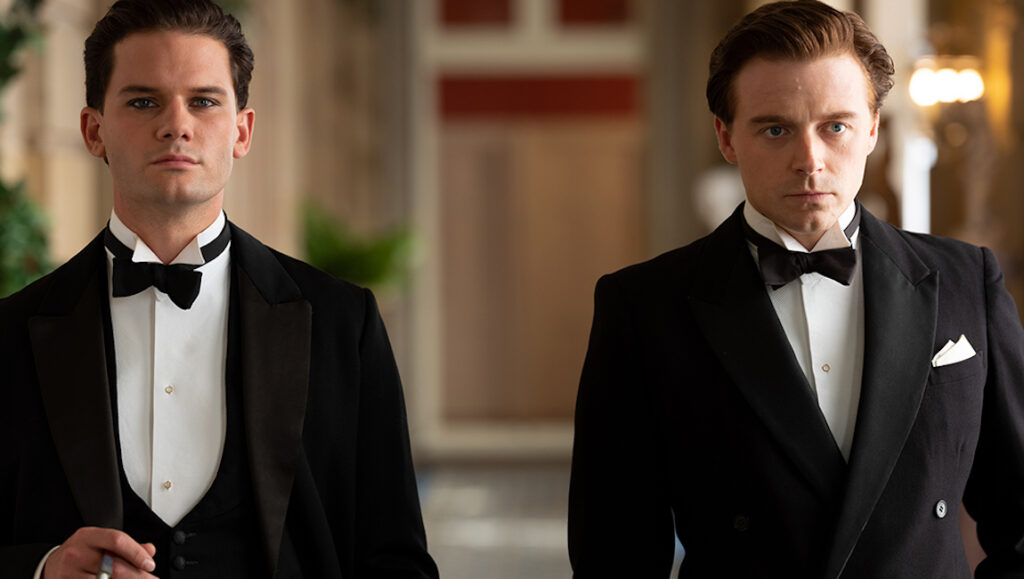Terence Davies‘ Benediction is beautifully melancholic work, one that bursts benevolently onto the screen with immense feeling.
The cinema of veteran English auteur Terence Davies has always been concerned with outsiders, whether these are people who live lower-class lives on the outskirts of society or highbrow individuals who stand against their elitist social trappings. In 2016’s A Quiet Passion, Davies took as his subject the life and work of one of literature’s most famous outsiders, American poet Emily Dickinson, and he returns to the writer well with Benediction, a biopic of the bright-minded British poet and WWI soldier, Siegfried Sassoon — played by charming Scottish actor Jack Lowden as the young Siegfried and Peter Capaldi as his older version. Sassoon — known for his fiery anti-war rhetoric, as a fierce critic of the day’s authoritative jingoism, and as a wounded spirit who’s mainly surrounded by narcissistic lovers — is indeed a perfect character for a Davies’ film which not only revolves around his recurring notions of fatally-oppressed yearnings, loss, the transient joys of life, and the everlasting burdens of grief and regret, but which also represents a deeply personal auto-portrait for the Liverpudlian master.
Davies’ virtuosity in shaping a very articulate style — both in terms of direction and writing — will likely be obvious to most viewers. Although, understandably for some, the obsessively controlled and refined academic theatrics and literary-fueled aesthetic — elegant compositions, scrupulous static staging and figural placement, frequent symmetrical shots, non-stop aphoristic dialogues — which he has specifically tended toward in recent years might be regarded as stilted and grandiose, broadly bare of the free-flowing, less excessively cerebral nature of his earlier (and better) films. But even if such criticisms are valid to some degree, they don’t necessarily reveal the whole truth about Davies’ later approach, which is even more evident in Benediction. The fact is, fortunately, Davies’ style here (as was also the case in A Quiet Passion) is delicately grounded between both the prosaic and poetic, where the subtle nuances and warm impressions of emotionality are still able to manifest underneath the solid, more-or-less impenetrable visual and verbal surface. And indeed, some of the most touching scenes in Benediction come when Davies masterfully connects the different verses from Sassoon’s poems to the various real-life situations, characters, and moments that empirically inspired his art and imagination.
It’s as if here Davies deliberately intends to subvert from within the typical, prim Anglo-Saxon academicism what one, for example, can usually find in BBC teleplays and historical biopic docs, or in the sentimentality of Jane Austen’s popular novels (which the director has openly expressed his aversion for). Davies, who previously delivered one of the most singular essay films of all time with 2008’s Of Time and the City, interweaves grainy black-and-white archival footage from WWI throughout Benediction, and if the film begins as a kind of mix of painterly tableaux (comparable to Gustav Deutsch’s cinematic snapshots of Edward Hopper paintings in Shirley: Visions of Reality) with something like the work of Michael Almereyda (for his anachronism and remarkable use of moving pictures in the background), it gradually unravels itself, evoking the mingled atmosphere of Fitzgerald’s The Great Gatsby (especially during a party scene), a combination of Whit Stillman’s Love & Friendship and James Ivory’s Maurice, and obviously, the earlier films of Davies himself.
And so, in the same way that Sassoon’s memories are filled with and scarred by traumas, haunted memories, and cherished experiences, Davies’ Benediction reveals itself to be a film that’s unconscious seems stamped by an extensive recollective history of art, literature, and cinema, too. It’s a beautiful, profound, and indeed very melancholic character study — never totally deprived of a humorous or satirical mood — through which the maverick septuagenarian portrays the never-ending horrors of the trenches, the absurdities of war, and the unfulfilled hopes and dreams for regaining lost loves and times. And if Davies’ elaborate modus operandi corresponds directly to Sassoon’s loquacious and encompassing environment, it’s only right that in the final, serene scene, Davies’ subversive style and his leading character get to break away from all the suffocating boundaries, letting the most subdued feelings benevolently burst out into silent, lonely tears, deep shivers, and soul-wrenching heartache.
Originally published as part of TIFF 2021 — Dispatch 4.


Comments are closed.